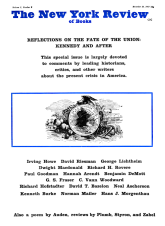I was not one of the Washington journalists who knew him well and saw him often. Before his nomination, I knew him scarcely at all. The first time I sat down alone with him was only a few days before his election. He had had a wild day campaigning in and around Philadelphia. He had shaken so many hands that his own right one looked like raw beef. One woman, running alongside his car, had held on to avoid losing her balance and perhaps being run over. There was a chance that he had dislocated a shoulder. It hurt badly. Around midnight, I joined him at supper in his cabin on the Caroline. After getting me settled, he said, “What do you know about Taper?” I couldn’t imagine what he meant. I had to ask him. “Taper,” he said, “you know, the one who writes that column in the Spectator.” I was at the time a correspondent for the London Spectator, and Taper was a pseudonym used by Bernard Levin, a political writer for that magazine, who has since become theater critic for the London Daily Mail. I told him what I knew, which wasn’t very much; Kennedy said he admired Levin and would enjoy meeting him.
I had three talks with him in the White House. There were several more “Taper” incidents. “I ran into Kahn the other day,” he said once. I wracked my brain. Herman Kahn, the thermonuclear-war man? The Aga Kahn? But wasn’t he dead? Aly Kahn? Otto Kahn? Dead, too, wasn’t he? Could it be a friend of mine, another Herman Kahn, an historian in the National Archives? Mohammed Khan of Pakistan? Who the hell was Kahn? He could see me struggling. “Jack Kahn, you must know him, on The New Yorker? He was in here doing a Talk of the Town story. He was talking to my secretary about my going to theaters in New York. I’ve been wondering about the piece. Do you know when it’s going to come out?” I knew nothing about it.
Another time, he seemed mildly and inexplicably upset about a New Yorker piece that had appeared—a profile of Pablo Casals by a man whose name really was Taper, Bernard Taper. “It was interesting,” he said, “but I figured it must have been written a long time ago. It wasn’t up to date.” Thinking fast. I assumed he meant that it had not said enough about the Casals concert in the White House. I asked him if that was it. “No, no,” he said, and he went on to explain that in three or four places it had described arrangements in Casals’ life that had changed in recent months. He seemed to feel that The New Yorker was somehow losing its grip if it couldn’t be au courant in such matters. “Who is this Taper?” he said. I told him a bit, mentioning that this Taper and Pierre Salinger were friends, having worked together together as reporters in San Francisco. He went on with something like. “What did you make of that last Norman Mailer piece?”
Once, when I felt that I had really taken up more than enough of his time, I tried to prepare the way for my leaving with what would have been a lame and elaborate opening. What I meant to say was something like this—that I would really worry about the country if I thought that its President was putting in a lot of time talking with someone like me about Norman Mailer, Bernard Taper, and so forth. I forgot how it went, but I got out just a few words, like “Mr. President, I’m taking up too much of your time. I think that if…” “You think,” he said, “that I wouldn’t be much of a President if I spent much of my time this way.”
This Issue
December 26, 1963



